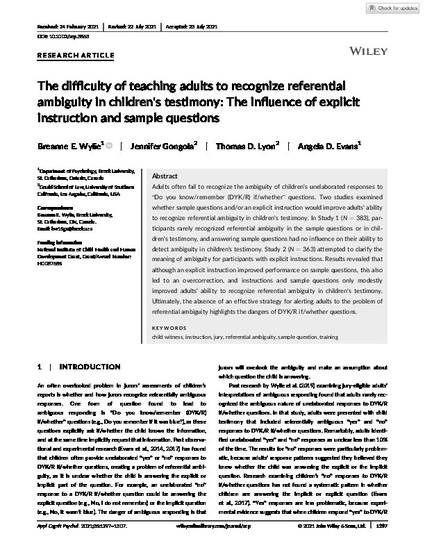
Article
90. The difficulty of teaching adults to recognize referential ambiguity in children's testimony: The influence of explicit instruction and sample questions.
Applied Cognitive Psychology
(2021)
Abstract
Adults often fail to recognize the ambiguity of children’s unelaborated responses to ‘Do you know/remember (DYK/R) if/whether’ questions. Two studies examined whether sample questions and/or an explicit instruction would improve adults’ ability to recognize referential ambiguity in children’s testimony. In Study 1 (N = 383), participants rarely recognized referential ambiguity in the sample questions or in children's testimony, and answering sample questions had no influence on their ability to detect ambiguity in children’s testimony. Study 2 (N = 363) attempted to clarify the meaning of ambiguity for participants with explicit instructions. Results revealed that although an explicit instruction improved performance on sample questions, this also led to an overcorrection, and instructions and sample questions only modestly improved adults’ ability to recognize referential ambiguity in children’s testimony. Ultimately, the absence of an effective strategy for alerting adults to the problem of referential ambiguity highlights the dangers of DYK/R if/whether questions.
Keywords
- referential ambiguity,
- training,
- sample question,
- instruction,
- child witness,
- child testimony,
- child forensic interviewing,
- child abuse,
- child sexual abuse,
- child neglect
Disciplines
Publication Date
Summer July 23, 2021
Citation Information
Wylie, B.E., Gongola, J., Lyon, T.D., & Evans, A.D (2021). The difficulty of teaching adults to recognize referential ambiguity in children's testimony: The influence of explicit instruction and sample questions. Applied Cognitive Psychology, 35, 1297-1307.
